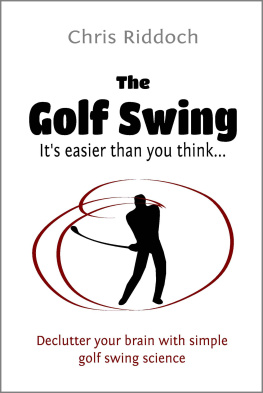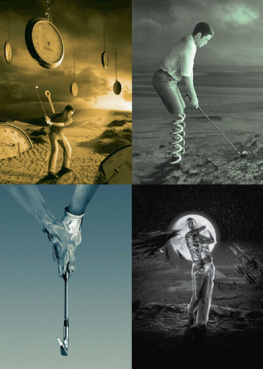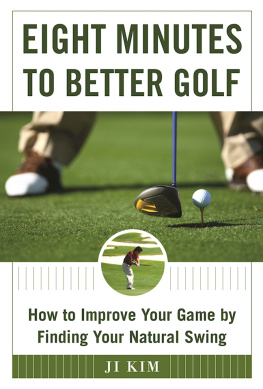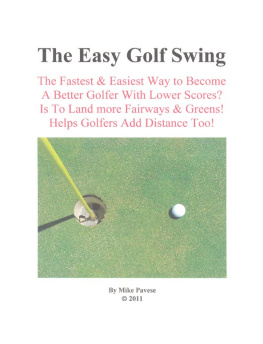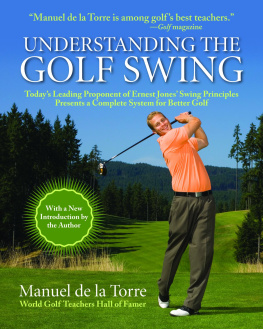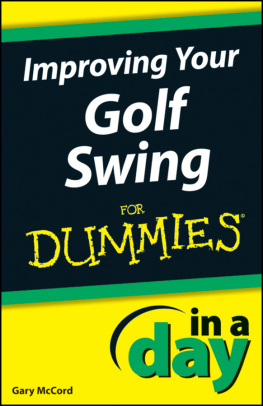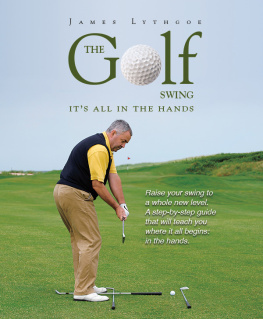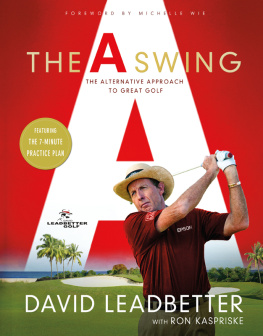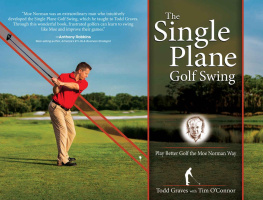The Golf Swing
Its easier than you think
Chris Riddoch
No part of this book may be reproduced in any form whether by electronic or mechanical means including information storage and retrieval systems, without permission in writing from the author.
Chris Riddoch asserts the moral right to be identified as the author of this work.
The Golf Swing
http://www.TheGolfSwingZone.com
Image credits
Bigstock: cover, 45, 55, 61, 63, 67, 68, 69, 75, 113.
Florida Center for Instructional Technology: 107.
Fotosearch: 93.
Shutterstock: 3, 5, 13, 15, 33, 37, 77, 79, 101, 109.
Thinkstock: 1, 25, 105.
No copyright holder could be located for Bernard Darwins book Tee Shots and Others .
Copyright 2012 Chris Riddoch
All rights reserved
ISBN-10: 1479123943
ISBN-13: 978-1479123940
For Maya
Table of contents
Acknowledgements
Many friends and colleague s have contributed both time and expertise to the creation of this book. Their insightful comments have been invaluable and Im extremely grateful to all of them.
In particular, Dr Grant Trewartha (University of Bath) and Professor Colin Boreham (University College, Dublin) commented on scientific accuracy. Dr Sean Cumming (University of Bath) contributed valuable materials on coaching. Golfing colleagues Philip Lindner and Dick Moore advised on content, readability, and style. My wife Maya assisted with cover and interior design, and most importantly tolerated my hours at the computer with exceptional grace. Interactive Frontiers, Inc. (Plymouth, MI) kindly gave permission to use V1 swing analysis software in the design of the cover image.
Im also hugely indebted to the many scientists around the world who carried out the high-quality research that makes the book possible. I apologise for being unable to cite all your work individually.
About the author
Chris Riddoch is a professor of sports science who has published more than 200 scientific articles on sport and exercise. A scratch golfer in his teens, he represented his college (Borough Road), his county (Cheshire), and had two trials for England (not selected, alas). He is married to Maya and they live in Stockholm.
Other books
Expert Putting: the science behind the stroke
Winning at Sport: science, skill and the new psychology of outstanding performance
Perspectives on Health and Exercise (with McKenna, J)
Introduction
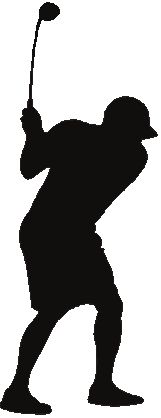
This book has just one ai m : to declutter our golfing brains. Because theyre full. We try to understand how to swing a golf club, but the more we try, the deeper we descend into the swing theory quagmire. Unfortunately, weve transformed the golf swing from a natural, human striking skill similar to a tennis serve, cricket shot, or baseball hit into a complicated shopping list of things we dont understand and cant remember.
The internet has added further complexity, spawning a vast, electronic reservoir of diverging opinions about the golf swing, all easily accessible with just a few clicks of a mouse. Unfortunately, the golf swing has become a hugely complex creation, shrouded in mystery and confusion. The time must be ripe for a clearing-out exercise; we the dazed and confused golfers need a way out.
This book provides one. Using a scientific analysis of high-quality research, it cuts through the buzzing bewilderment by separating golf swing fact from golf swing fiction. The analysis uses only research published in scientific journals, ensuring that all source information has been subjected to a high level of scientific scrutiny. The book addresses two areas:
How humans learn physical skills
How the golf swing works.
It identifies five key skills one mental and four physical that are essential to making an effective golf swing. The book explains each skill in detail and outlines a simple, effective way to learn them. This approach combines the best scientific knowledge of not only golf swing mechanics, but also the powerful, innate biological systems that enable us to learn them. All golfers from beginners to tour professionals will benefit.
Part 1 explains the nature of the golf swing problem and how treating the swing as a long series of perfect positions hinders learning. Part 2 describes how humans learn skills and explains the critical role of swing thoughts. Part 3 explains the golf swings five key skills. Finally, Part 4 suggests a practical way forward a way to make it happen.
In the interests of readability, individual scientific references havent been included in the text; however, key concepts have been attributed as appropriate via endnotes. Annex 2 lists the scientific sources used to compile the book.
Part 1. The problem with the golf swing
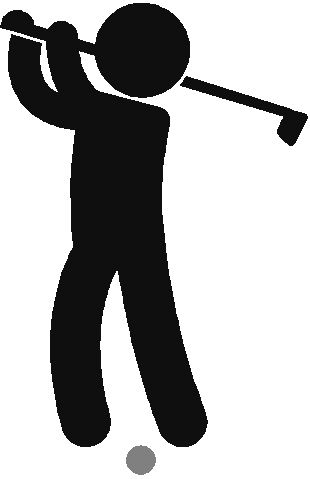
Solitary struggling with a recalcitrant club is essentially a good thing . It is likely to become a deleterious process if it involves a reconsideration of all the theories proposed by all the pundits, followed by a trial of them all in turn. It is this conflict of ideas, the constant wondering if we might not do better some other way, which undermines the confidence and loses half crowns.
Bernard Darwin, 1911
Dazed and confused

Bernard Darwins observatio n suggests that information overload has existed in golf for more than a century. And in the 100 years since, overload levels have increased inexorably, as we further develop technology to scrutinise the golf swing in ever-more forensic detail. Today, the amount of information about what moves where during a golf swing is simply overwhelming. The volume of material disheartens us, its contradictions perplex us, and the jargon frustrates us. The big problem with todays golf swing isits too big a problem .
Unfortunately, humans dont have learning systems that can cope with large amounts of information. In fact, the human brain works in exactly the opposite way to learn physical skills, it requires simplicity . But now, when we strive to improve our swings, where should we start? Should we swing on one plane or two? Should we stack or tilt? Or double shift? Is the thumbs-up swing better than the hammer or biokinetic swing? How do we supinate our left wrists? How do we know whether our power accumulators are accumulating? Should we check our L factor, O factor, R factor, S factor, X factor, Triple X factor, Y factor, Z factor, crunch factor, mind factor, or smash factor?
Like a dissected animal, the golf swings organs together with innumerable systems for fitting them back together fill the pages of magazines, books, and websites. And something new appears every week: an unremitting torrent of secrets, breakthroughs, discoveries, proven new theories, and revolutionary methodseven magic solutions. This state of confusion has prompted one swing coach to comment:
Todays golf swing is a mechanical jigsaw puzzle, in which one attempts to put together innumerable parts in a preconceived way . There is always another piece of the puzzle to be found and worked on . We are trapped in a web of mechanical complexity.
Peter Lightbown, 2010
Professor Butts self-operating napkin
Professor Butt raises a soupspoon to his mouth and spills some soup down his chin. Luckily, he has a system for cleaning it up. Tied to the soupspoon is a string that jerks a ladle, throwing a firecracker past a parrot. The parrot jumps, tilting its perch, upsetting a bag of seeds into a bucket. The bucket drops and pulls a cord, lighting a cigar lighter, setting off a skyrocket. This causes a sickle to cut a string, causing a pendulum with a napkin attached to swing back and forth, wiping Professor Butts chin. The self-operating napkin features in a cartoon by Rube Goldberg, famous for his complex devices that perform the simplest tasks in highly convoluted ways.
Next page
